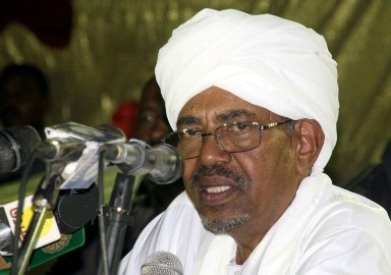Sudan’s Bashir vows to implement the outcome of dialogue conference
October 19, 2015 (KHARTOUM) -The Sudanese president Omer Hassan al-Bashir has reiterated his pledge to adopt the outcome of the dialogue conference denying that the government sought to achieve peace out of weakness or dictation by foreign powers.

He said his government has a clear strategic vision for peace, adding “We seek to strength it with the outputs of the national dialogue”. He expressed hopes to overcome obstacles that hampering the path for stability and prosperity in Sudan.
Bashir who addressed the opening of the second parliamentary session, said the Sudanese army and the regular forces managed to curb the hostile actions of the rebel movements and limited their existence to small pockets.
The government and its allied parties launched on 10 October the national dialogue conference with the hope that they can adopt measures that proving the seriousness of the process and attract the holdout armed and political opposition groups.
He said that conditions on the ground in all battlefields were in favour of the Sudanese army before declaration of the cessation of hostilities.
Bashir pledged that the year 2016 would witness the imposition of the state authority across the country besides protecting the borders through enhancing the capabilities, training and qualification of the army and promoting the military industries to serve the military and civil purposes.
The Sudanese president added that the government will promote the police presence across the country to protect the citizens and their property, vowing to enhance the police services for the citizens by establishing integrated and advanced services complexes.
Last month Bashir declared a two-month cessation of hostilities in South Kordofan, Blue Nile and Darfur. Later he expressed readiness to declare a permanent ceasefire given that rebels show desire for achieving peace.
On Sunday, the rebel umbrella Sudanese Revolutionary Front (SRF) declared a six-month cessation of hostilities and expressed readiness to negotiate the details of this truce with the government ahead of peace talks.
Also, the African Union High level Implementation Panel (AUHIP) plans to hold talks between the government and rebel groups to discuss a cessation of hostilities agreement.
DARFUR REFERENDUM
Bashir pointed to peace efforts and agreements signed with rebel groups in Darfur, saying that the Doha Document for Peace in Darfur (DDPD) has been extended for another year.
“Arrangements are proceeding well to hold the referendum in all Darfur states in April 2016 in order to lay the foundation for the future that is characterized by rational political practice in the region,” he added.
On June 28 th, Bashir Sunday issued a presidential decree extending the term of the Darfur Regional Authority (DRA) for one year effective 15 July, 2015.
The DRA was established to serve as the major body for implementing the Doha Document for Peace in Darfur (DDPD) signed between the government of Sudan and the former rebel Liberation and Justice Movement (LJM) in 2011.
STATE REFORM
The Sudanese president said that more than sixty laws will be introduced or amended during the second parliamentary session in order to enhance the effectiveness of the judicial organs, facilitate the litigation procedures and to develop deterrent laws against crimes.
He vowed to continue efforts to make institutional and legislations reforms in order to achieve transparency through various means particularly the electronic financial transactions.
Bashir pointed that the reform of the state organs begins by strengthening the civil services in order to create a working system that is based upon efficiency, impartiality, integrity, transparency and accountability.
Last August, Sudan’s first vice-president, Bakri Hassan Salih, launched a program of civil service reform which aims to end two-and-a-half decades of public service politicisation.
Since the military coup in June 1989, the regime dismissed thousands of civil servants in what was known as the “dismissal for public interest” campaign to replace them with Islamists cadres under the slogan of “empowerment”.
FOREIGN POLICY
Meanwhile, Bashir stressed that Sudan’s foreign policy will remain based on respect of the countries’ sovereignty and commitment to the principles of non intervention in the domestic affairs of other nations besides respecting peoples choices.
Bashir reiterated Sudan’s firm stance in supporting the just Palestinian cause and the legitimate right of the Palestinians to restore their land and to defend the Al-Aqsa Mosque, pointing to recent crackdown by Israel against the Palestinian people.
He said the government will press ahead in its foreign policy to reinforce its strategic partnerships with China, Russia, Turkey and India and to seek to continue the talks with Europe and the United States to resolve the outstanding issues including the economic sanctions, foreign debts and development assistance.
Sudan has been on the US list of countries supporting terrorism since 1993, for allegedly providing support and safe haven for terrorist groups.
Also, Washington imposed economic and trade sanctions on Sudan in 1997 in response to its alleged connection to terror networks and human rights abuses. In 2007 it strengthened the embargo, citing abuses in Darfur which it labelled as genocide.
Sudan’s external debt is estimated to be around $46 billion. Khartoum says it has completed technical and economic requirements for debt cancellation but observers assert that it is difficult for Sudan to secure it without Western backing.
(ST)
